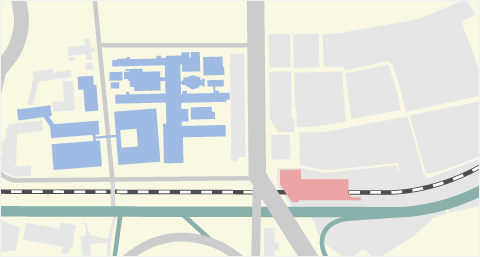Discover Keio University Hospital
-
 Peace of Mind
Peace of Mind
We want patients and their families to fully understand their condition and rest assured that you are receiving the most appropriate treatment.
Due to advancements in medical systems and technologies in recent years, accountability to patients and their families has become increasingly important. It is essential that we properly explain a patient’s condition so that they can be sure that they are receiving the most appropriate treatment and that their family can avoid any unnecessary worries.
We make a point of using easy-to-understand language to explain the technical side of treatments, and reference medical records to detail any possible risks and side effects. If no treatment is required, we still take the time to sit down with our patients and explain why that is the case to make sure there are no further concerns and that everyone is on the same page. We also welcome patients who are interested in participating in clinical trials, and aim to explain the process so that both patients and their families are comfortable with participating.
-
Understanding Disease
Learn more about disease using the following tools:
- KOMPAS (Keio Hospital Information & Patient Assistance Service) (Available in Japanese)
- More than 600 diseases and their treatments
- Easily search by keyword or by body location
- Get the latest information on Keio Medicine and meet our newest doctors and their research
- You can also search by doctor or by disease. (Available in Japanese)
- Our database currently has more than 600 doctors and 10,000 disease names.
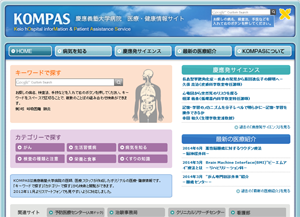
- KOMPAS (Keio Hospital Information & Patient Assistance Service) (Available in Japanese)
-
Information Management

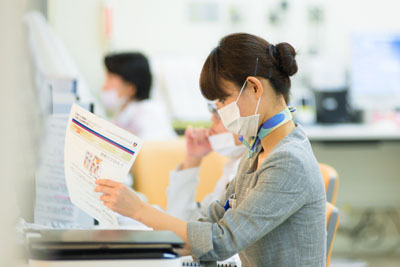
Keio University Hospital is committed to the protection and appropriate use of personal information.
We handle a wide range of personal information of students, patients, and research participants, as well as various education, research, and health care-related information. We are committed to properly managing it all.
The proper handling of information is now fundamental and demanded by society. Why would patients, who value their privacy, be willing to provide us with such sensitive information? It all comes down to trust.
Our patients trust that we are aware of the extreme importance of their private information, and that we take all necessary precautions to ensure its safety. Whether digital, printed, or spoken aloud, we are always aware of the environment in which your information exists and handle it accordingly.
-
3,000 Outpatients Daily

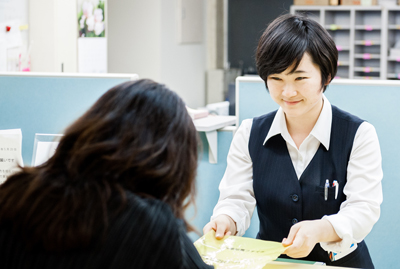
On an average day, Keio University Hospital treats 3,000 outpatients. This is the largest in the country.
Our telephone operators also handle hundreds of appointment confirmations and reschedule requests. Phone lines are only open until 4:00 p.m., and most of those requests are handled before lunch.
-
Roles
Hospitals, clinics, and other health care centers each play their role in providing patients with unique, personalized care. Keio University Hospital has been designated as an Advanced Treatment Hospital and a Regional Cancer Center by both local and national government organizations.
As an Advanced Treatment Hospital, we provide care for patients who require specialized treatments not commonly offered at general health care centers, including those who have been referred to us by other health care centers. In cases where continuous follow-ups at a local hospital are determined most beneficial, we will refer patients back to their original health care providers. In addition to advanced health care services, we are also dedicated to medical research, development, evaluation, and training.
Our hospital, together with other hospitals, clinics, and health care centers each play their role in providing patients with unique, personalized care.
- About Our Unique Medical Network
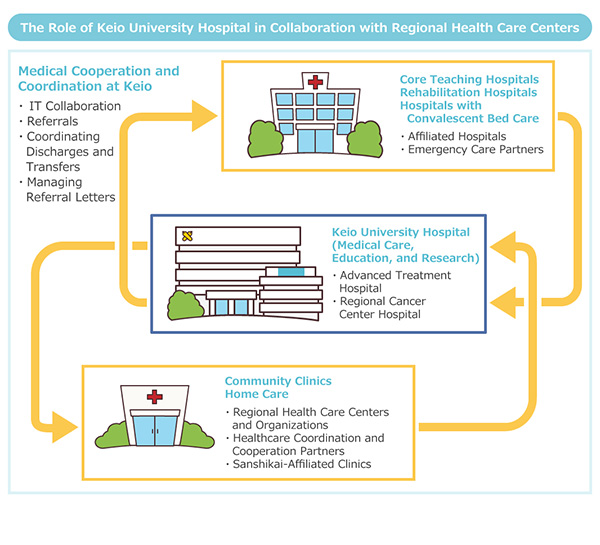
-
 A Group Approach to Patient-Centered Care
A Group Approach to Patient-Centered Care
Today we continue to redefine the boundaries of medical fields by carrying on first director Dr. Shibasaburo Kitasato’s vision of greater coordination between basic and clinical sciences. Every one of our staff, from doctors to nurses to pharmacists to medical social workers, is dedicated to our mission of providing compassionate, reliable, patient-centered health care.
The Immunotherapy Center, for example, brings together specialists from a range of departments (Rheumatology, Gastroenterology and Hepatology, Hematology, Orthopedic Surgery, Dermatology, Ophthalmology, as well as nurses and pharmacists) in a cross-disciplinary approach that is focused on providing patients with unique, personalized care.
Press Release: Immunotherapy Team Welcomes First Outpatients (Japanese)
Our Inter-Professional Education (IPE) Program improves cooperation and communication between students in the School of Medicine, Faculty of Nursing and Medical Care, and the Faculty of Pharmacy, allowing for the development of health care professionals who will utilize Keio’s group approach to patient-centered care.
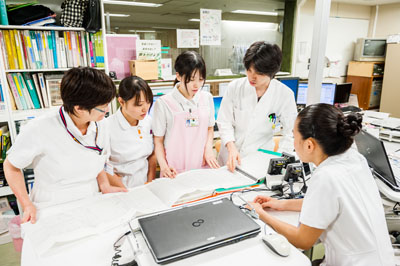
-
 The Pen Mark
The Pen Mark
The Pen Mark is a well-known symbol of Keio University. It is said that more than 100 years ago early Keio students were inspired to create the mark after finding the phrase “the pen is mightier than the sword” in one of their textbooks. Today, the Pen Mark trademarked and legally protected as the official mark of Keio University.
- The Origin of the Pen Mark
- Information on Using the Keio Pen Mark
Rules for Use(Japanese)
-
 Yukichi Fukuzawa and
Yukichi Fukuzawa and
Shibasaburo KitasatoRenowned bacteriologist Shibasaburo Kitasato, known for developing a serum therapy for tetanus, helped establish the Keio University School of Medicine in 1917 and served as its first dean. He was also instrumental in the opening of the Keio University Hospital three years later in 1920, serving as the hospital’s first director. Yukichi Fukuzawa and Shibasaburo Kitasato—recognized as two of the great pioneers of modern Japan—understood each other’s passions and developed a close friendship. When Dr. Shibasaburo Kitasato established the Institute for Infectious Diseases in 1892, Fukuzawa presented him with a Chinese‐style poem entitled “A Message to Physicians”:
Medicine is an endless tug of war between heaven and man. Doctors, do not say that your role is merely to assist natural recuperation. To employ every possible means, with the keen vision of Li Lou and knowing touch of Ma Gu—this is the essence of medicine.
The spirit of Fukuzawa and Kitasato continues to underpin life at the School of Medicine today. Our staff are continually refining their skills, and accumulating training in order to enhance inter-professional teamwork and provide each and every patient with the best possible care.
- About Fukuzawa’s “Message to Physicians”
Fukuzawa’s “Message to Physicians” (Japanese)
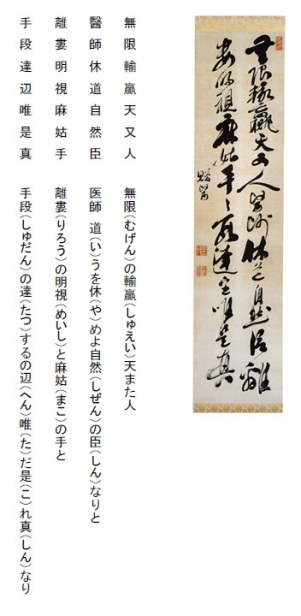
-
 Mutual Communication
Mutual Communication
We strive for positive communication in order to deepen mutual trust with our patients and their families.
Building and maintaining that trust is essential in making sure that we can provide care that is centered on both the patient and their family. It is very important that we keep communication flowing in both directions in order for us to properly understand any concerns the patient may have, and to make sure the patient has realistic expectations about their treatment.
We act on our commitment to mutual communication by proactively greeting patients, listening to their concerns, and providing them with updates and the latest information. Through these daily interactions our staff teases out the possible expectations and concerns a patient may have, constantly working to improve their communication skills.
-
Health and Longevity
The Center for Preventive Medicine is focused on extending healthy life expectancy, and offers personalized evaluations through its Executive Health Assessment Program (Japanese)
The symbol of health and longevity is, of course, the centenarian, a person who has lived to or beyond the age of 100 years. Japan had only around 100 centenarians in 1950, but since the 1970s the number of centenarians on record has rapidly increased, with 28,000 in 2006, 43,000 in 2010, and over 50,000 in 2012--1 in ever 2,300 Japanese people are now centenarians. The Keio University School of Medicine is currently carrying out diverse research centered around centenarians and supercentenarians, looking at health and disease at the genetic level in order to create more robust medical treatments in the future.Center for Supercentenarian Medical Research (Japanese)
-
What is Clinical Research?

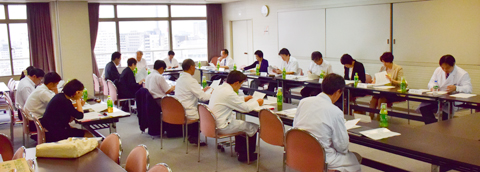
Clinical research is medical research that seeks to understand diseases and their causes, and to improve diagnoses and treatments. Clinical research in mainly undertaken to ascertain the merits of different treatment methods, and to assess the safety and effectiveness of drugs and medical devices in relation to disease prevention, diagnosis, and treatment. Today’s diagnosis and treatment methods, as well as the latest medical technologies, have been developed over years, sometimes decades. These kind of developments require a great deal of research, which requires the cooperation of both patients and healthy people. Clinical research in particular is based on the understanding and cooperation of patients.
All clinical research is carried out according to strict guidelines and ethical principles, including the World Medical Association’s Declaration of Helsinki and the Japanese Ministry of Health, Labour and Welfare’s Ethical Guidelines or Clinical Research.
Ensuring that clinical research is properly carried out requires us to be both ethically minded (protecting the rights and safety of patients participating in the research), and scientifically minded (maintaining the legitimacy and objectivity of research data). This is required of all clinical research.
All clinical research at the Keio University Hospital is also thoroughly reviewed and approved by the Keio University Hospital Institutional Review Board and the Keio University School of Medicine Ethics Committee. The status of clinical research is also monitored on a regular basis after is has begun.
The Institutional Review Board and Ethics Committee both consist of third-party members who have no vested interest in the research. To ensure a fair and neutral standpoint, members consist of a diverse group of both male and female civilians as well as specialists from a variety of fields both within and outside of Keio.
Anyone interested in participating in clinical research trials can receive a full explanation with no obligation to commit.
- Clinical and Translational Research Center
Keio University Hospital Clinical and Translational Research Center Website (Japanese)
- Keio University School of Medicine Ethics Committee (Japanese)
-
 Hospital Staff
Hospital Staff
Keio University Hospital’s 2,600 medical staff are as diverse as their numbers. White coats and scrubs provide comfort that allow our staff to focus on their patients and provide the highest level of service and expertise.
Learn About Who Works at the Hospital (Japanese)
-
Early Treatment
Existing cancer therapies have some limitations. For instance, patients are often unsure about which hospital department to consult, and may have to visit several departments, which results in a longer wait while trying to determine the most appropriate tests and treatments. To resolve these problems, we established the Initial Consultation Cancer Clinic at the Cancer Center (available in Japanese). By bringing together specialists from different departments, this one clinic is able to provide a range of interdisciplinary patient-oriented care.
- Initial Consultation Cancer Clinic Press Release (Japanese)
- Cancer Center Website (Japanese)
- Cancer Center Introduction (Japanese)
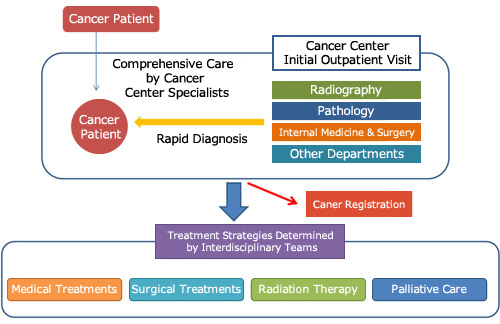
-
Medical Technique, Scientific Research, and Humanitarianism
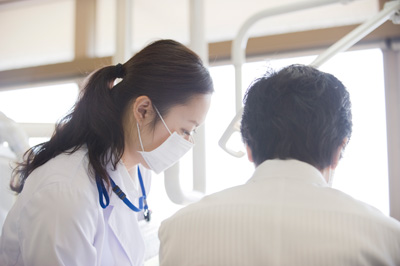
Since opening in 1917, the Keio University School of Medicine has led the development of health care in Japan, producing many outstanding leaders, as well as serving as the core of a robust network of hospitals spread across the country. As the needs of health care expand and diversify, we are dedicated to training medical professionals who value and balance the three fundamentals of medical technique, scientific research, and humanitarianism.
Medical law dictates that graduates who receive their medical license must then spend at least two years in clinical training. Keio University Hospital, one of nearly 1,000 clinical research facilities in Japan, accepts 50 residents every year from medical schools across the country. We also welcome and train other medical professionals, including nurses, pharmacists, lab technicians, and radiology technicians. The people we train today will lead the way in defining the future of patient-centered care.
-
 Basic Medical Sciences and Clinical Medicine
Basic Medical Sciences and Clinical Medicine
Practical medicine that is directly related to diagnosing and treating patients is called clinical medicine. On the other side, medicine that explores the structure and functions of the human body and the origins of disease is called basic medicine. Dr. Shibasaburo Kitasato, the first dean of the School of Medicine, and first Keio University Hospital Director, proposed for the uniting of these two halves of medicine. During his speech at the opening ceremony for the Keio University Hospital on November 6, 1920, Dr. Kitasato said:
“Our new school of medicine will do away with the longstanding and deleterious practice of separation of individual fields within the medical world and achieve greater coordination between basic and clinical sciences. In this way, we shall make it our unique mission to unite as one family and together devote ourselves to the study of medicine.”
Combining basic and clinical knowledge is the only way to truly develop medical care. That spirit continues to guide life at the Keio University Hospital today. -
 Compassionate Behavior
Compassionate Behavior
We take great pride in our appearance and behavior, and strive to live up to Keio’s founding principle of the university as a “source of honorable character.”
Of course such ideals are not unique, but they are of great importance to us because of the trust and expectations that Japanese society has of Keio University in particular.
Every day we find ourselves in new positions and new situations, interacting with patients who each think and feel in their own way. In such an environment it is not enough to merely follow rules or a set of guidelines. We need to constantly pay attention to how we respond to others, and adjust our behavior accordingly.
And so we pay attention to our words and actions, not merely because of the rules, but because we understand that they form the basis of our relationships with our patients and allow us to engage them with compassion.
-
Early Detection
Proactive checkups can help prevent disease and allow for minimally invasive treatments to succeed when a disease is detected early on. Since the summer of 2012 we have been focused on early detection by providing comprehensive medical exams through the Center for Preventive Medicine.
Comprehensive medical exams focus on the early detection of three main lifestyle-related diseases: cancer, heart disease, and cerebrovascular disease. We also offer specialized, highly accurate exams and programs that focus on women’s health concerns, anti-aging, exercise, the brain, and more. Post visit you will continue to receive exceptional care through follow-up visits and guidance tailored to you.





